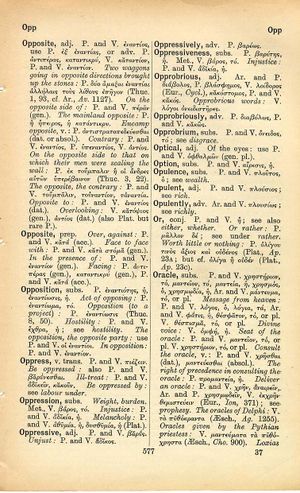or: Difference between revisions
From LSJ
ψυχῆς πείρατα ἰὼν οὐκ ἂν ἐξεύροιο πᾶσαν ἐπιπορευόμενος ὁδόν· οὕτω βαθὺν λόγον ἔχει → one would never discover the limits of soul, should one traverse every road—so deep a measure does it possess
mNo edit summary |
m (Woodhouse1 replacement) |
||
| Line 1: | Line 1: | ||
{{Woodhouse1 | {{Woodhouse1 | ||
|Text=[[File:woodhouse_577.jpg|thumb|link={{filepath:woodhouse_577.jpg}}]] | |Text=[[File:woodhouse_577.jpg|thumb|link={{filepath:woodhouse_577.jpg}}]] | ||
P. and V. [[ἤ]]; see also [[either]], [[whether]]. | ===conjunction=== | ||
[[or rather]]: P. [[μᾶλλον]] δέ; see under [[rather]]. | |||
[[prose|P.]] and [[verse|V.]] [[ἤ]]; see also [[either]], [[whether]]. | |||
[[or rather]]: [[prose|P.]] [[μᾶλλον]] δέ; see under [[rather]]. | |||
[[worth little or nothing]]: [[prose|P.]] [[ὀλίγου τινὸς ἄξιος καὶ οὐδένος]] ([[Plato]], Ap. 23A; but cf. [[ὀλίγα ἢ οὐδέν]] ([[Plato]], Ap. 23C). | |||
}} | }} | ||
Revision as of 08:55, 20 May 2020
English > Greek (Woodhouse)
conjunction
P. and V. ἤ; see also either, whether.
or rather: P. μᾶλλον δέ; see under rather.
worth little or nothing: P. ὀλίγου τινὸς ἄξιος καὶ οὐδένος (Plato, Ap. 23A; but cf. ὀλίγα ἢ οὐδέν (Plato, Ap. 23C).

